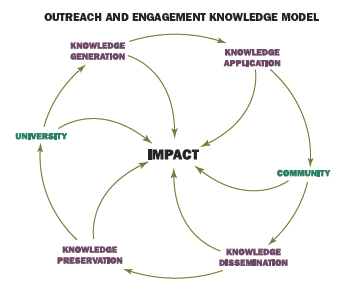What Is an Engaged University?
The Michigan State University Model
At Michigan State University, outreach and engagement are woven into every facet of academic life. The MSU model for working with communities encompasses the notion that engagement is embedded in the scholarly tradition — the generation, transmission, application, and preservation of knowledge. Outreach is not a separate "service" activity detached from teaching and research. It is part of the core academic mission of the University.
Engagement is embedded in scholarship
| ENGAGEMENT IS EMBEDDED IN SCHOLARSHIP
|
Examples of Traditional
Academic Activity
|
Scholarly
Engagement Activity
|
| University faculty provide instruction to undergraduate and graduate students in campus classrooms and laboratories.
|
Engaged
TEACHING
occurs when ...
...credit and noncredit learning opportunities are taken off campus, online, and to community-based settings to increase access; or when service-learning experiences advance students' knowledge about social issues while contributing to the immediate goals of a project.
|
| University faculty members pursue research studies according to their various professions and interests, and publish results in academic books and journals.
|
Engaged
RESEARCH
occurs when ...
...a collaborative partnership conducts an investigation for the direct benefit of external partners; outcomes of the research lead to improved, evidence-based practice.
|
| University faculty and students undertake departmental or college administrative duties and serve on committees.
|
Engaged
SERVICE
occurs when ...
...a faculty member summarizes current research literature about an issue for working professionals or community organizations, offers research-based policy recommendations to legislators at a committee hearing, or provides medical or therapeutic services to the public.
|

"Outreach is a form of scholarship that cuts across teaching, research, and service. It involves generating, transmitting, applying, and preserving knowledge for the direct benefit of external audiences in ways that are consistent with university and unit missions."
Model derived from Provost's Committee on University Outreach. (1993).
University outreach at Michigan State University: Extending knowledge to serve society.
Since the early 1990s, Michigan State University has been deliberate and purposeful in defining, planning, implementing, and assessing its outreach work. The scholarship of engagement has, in fact, become a signature area of the University.
In practical terms, this means striving to ensure that engagement efforts are mutually beneficial for all partners—community, faculty, students, and others—and that all are able to participate in the design, operation, and evaluation of projects. It also means giving careful attention to the process of developing relationships and favoring multi-disciplinary approaches to problem-solving. Pragmatic, or outcome-based, scholarship is a given. Above all, the opportunity to participate in building communities, whether of place, profession, or interest, brings pleasure and satisfaction to our work.
How MSU Engages with Communities
- Every college and major administrative unit at Michigan State University engages with communities.
- Concerns addressed by MSU partnerships include cultures and societies, business and industry, families, community development, preK-12 and higher education, foods and fibers, government and policy, health, labor, the environment, and public safety.
- Organizational partners may be businesses or industries, human service agencies, nonprofit organizations, foundations, government offices, neighborhood centers, research think tanks, school districts, or medical clinics.
- Engagement may take the form of research, expert assistance, credit or noncredit learning opportunities, events and information for public audiences, service-learning, or clinical services.
- Partnerships range from rural to urban and local to international.
- Much of MSU's engagement work addresses issues of racial, ethnic, gender, or other diversity and is carried out by diverse faculty teams.
- Student engagement enriches the learning experience and instills civic values for the next generation.